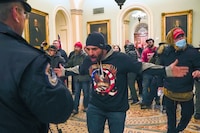‘Poster boy’ of Capitol riot sentenced in Jan. 6 attack

“I wanted Q to get the attention,” Jensen told the FBI after his arrest. “I basically intended on being the poster boy.”
“You … put yourself at the forefront of the mob,” U.S. District Judge Timothy J. Kelly told Jensen in court Friday. “There was nothing patriotic about it, no matter how much you might not have liked how the process of electing a president was perceived.”
Kelly noted that Jensen traveled to Washington with others carrying military-style rifles, was one of the first 10 people who breached the Capitol, and “waved on” and encouraged others to join him. The judge said America’s freedoms of speech, petition and protest carry the responsibility of doing so peacefully.
“What no one can do under any circumstances is become part of a mob using violence and the threat of violence to disrupt Congress’s ability to fulfill its role to process the certification of the electoral vote. That’s what you did,” Kelly said. “It’s a miracle that more people were not injured and did not lose their lives that day. … What would have happened if that group you led turned the other way into a chamber full of Senators, God only knows.”
Jensen, a QAnon conspiracy follower, was found guilty at trial in September of seven federal counts after coming to Washington believing that members of Congress and Vice President Mike Pence were going to be arrested for opposing President Donald Trump’s effort to overturn the results.
Prosecutors asked for a 64-month sentence, at the midpoint of a 57- to 71-month federal guidelines range, calling Jensen “a ringleader during the attack on the U.S. Capitol.” Jensen was convicted of three felony offenses, including rioting, assaulting police and obstruction of a congressional proceeding, punishable by up to 20 years.
Jensen “came to Washington, D.C., prepared for violence, and when the day approached, he played a significant role leading the violent crowd past the police line, into the building and through the halls of the Capitol,” assistant U.S. attorneys Emily W. Allen and Hava Mirell wrote in sentencing papers.
U.S. Capitol Police Inspector Thomas Loyd told the court that Jensen had Goodman to thank for being able to leave the building on his own feet, crediting the officer’s “quick thinking” for helping prevent rioters from attempting to breach the Senate Lobby doors.
If they had, “there would have been tremendous bloodshed,” Loyd said, adding that several of his officers who were injured had to be carried out. He said 20 percent of 350 officers assigned to him have separated from the department.
Jensen’s defense asked for less than half that time, saying that despite Jensen’s “theatrical” role in the Capitol breach, he committed no violence and physically harmed no one. His defense also said he has freed himself of his seeming QAnon addiction, an outgrowth of sealed personal history that should categorize him as an “outlier” among Jan. 6 defendants.
“Mr. Jensen is a passionate man who became embroiled in conspiracy theories and conservative politics. However, he has no history of being a political activist. He is an uneducated union laborer who became overwhelmed by conspiracy theories disseminated on the internet,” defense attorney Christopher M. Davis wrote. “He was wrong. And now he remains incarcerated almost 2 years later, while his family suffers his absence.”
Jensen expressed no remorse in a statement to the court.
“I can’t change my past,” Jensen said. “I can only look to the future. I don’t intend to be involved in the justice system after this,” Jensen said. “I’d like to be involved in being a parent again and to go back to my normal life before I got involved in politics.”
Kelly said he would have given Jensen a longer sentence but for the extreme circumstances of his childhood.
Jensen’s lawyer argued, “I think he needs medical assistance to come to grips to what happened to him as a child … forces totally out of his control” related to his background, health and mental health.
Jensen was initially granted pretrial release but was returned to detention after two months in September 2021 for violating a federal judge’s order to stay off the internet, including by live-streaming an event hosted by MyPillow CEO Mike Lindell, who has promoted conspiracy theories about the 2020 election.
The restriction meant to separate Jensen from the far-right QAnon conspiracy theory, which the FBI has warned could encourage violence among some believers of its false foundational claim that a cabal of Satan-worshipping “global elites” and “deep state” international child-sex traffickers were engaged in plots to conduct a coup against Trump.
The FBI in a June 2021 threat assessment noted that more than 20 self-identified QAnon adherents had been arrested in the storming of the Capitol, stating that some of its violent followers were likely to begin believing that they had an obligation to shift “towards engaging in real-world violence,” while others disengaged.
The assessment said their presence underscored how the current environment “likely will continue to act as a catalyst for some to begin accepting the legitimacy of violent action.”
Davis said there are no such concerns with Jensen, writing: “Deterrence is a nonissue. The isolation of the pandemic, the allegations of the former president, and QAnon drops are all a thing of the past.”
This article has been archived for your research. The original version from The Washington Post can be found here.


